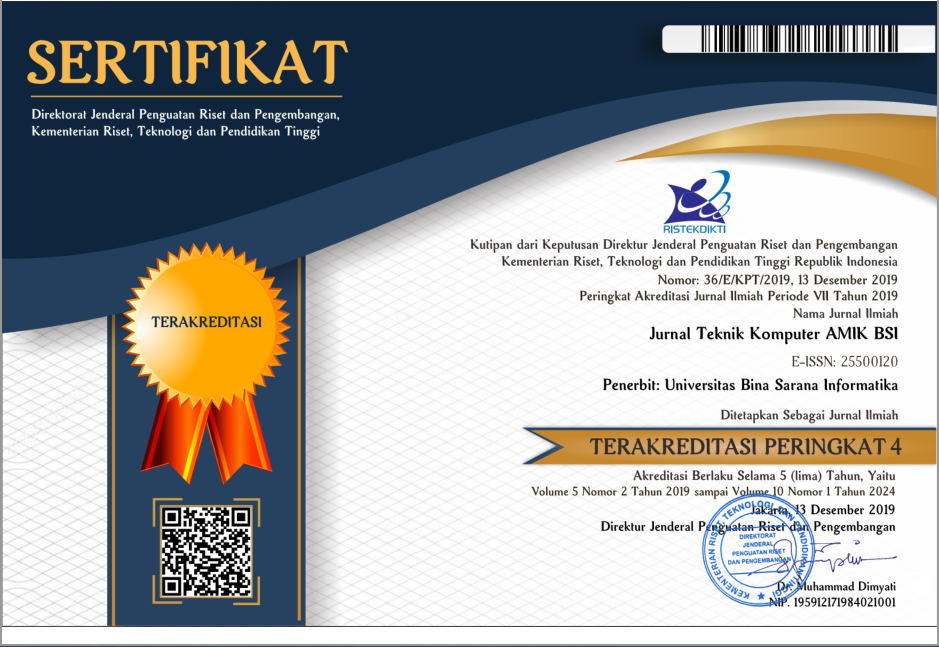Analisa Sistem E-Learning di SMK Menggunakan Metode DeLone and McLean dan UTAUT
Abstract
Researchers conducted an analysis of the E-Learning system at SMK Muhammadiyah Cimanggu using the Delone & McLean and Utaut methods. In measuring the service quality of the E-Learning system using the Delone & McLean and Utaut method, it has three independent variables including, Performance expectancy (PE), information quality (IQ) and service Quality(SVQ), with the dependent variable being user satisfaction. The analysis technique used is multiple regression with calculation tools using SPSS software. Based on the analysis that has been carried out, there is a positive and significant influence between Performance Expectancy (X1) and Behavioral Intention (X), accepted. The results of the analysis show that there is a significant positive relationship between Performance Expectancy (X1) and Behavioral Intention (X), with a path coefficient of 0.339, t-statistic of 2.264, and p-value of 0.024 and information quality has a significant effect on user satisfaction and satisfaction. user is directly proportional to customer loyalty, while the service quality variable does not have a significant influence on user satisfaction. However, simultaneously, all independent variables have a significant effect on the dependent variable. It is hoped that the website will continue to have good quality.
Full Text:
PDFReferences
Afifah, et al. (2022). Jurnal Basicedu. Jurnal Basicedu, Magelang, 02(01), 41–50.
Arifin, M. (2021). E-Learning: Edmodo Go Blog. umsu press. https://www.google.co.id/books/edition/E_Learning_Edmodo_Go_Blog/HIdIEAAAQBAJ?hl=id&gbpv=0
Firdausi, A. S., & Nuryana, I. K. D. (2023). Analisis Penerimaan Teknologi dan Kesuksesan Aplikasi ULA Pada Pelaku UMKM di Surabaya Menggunakan. Journal of Emerging Information Systems and Business Intelligence, 04(01), 91–99.
Lutfi, A., & Verawaty, V. (2020). Peran Kewirausahaan Sosial terhadap Pengembangan Usaha Sektor UMKM Saat Kondisi Pandemi Covid 19 di Kota Makassar. PARADOKS : Jurnal Ilmu Ekonomi, 3(2), 200–205. https://doi.org/10.33096/paradoks.v3i2.603
Nurul Walidah, Z., & Anah, L. (2020). Pengaruh Akuntabilitas Lembaga dan Transparansi Laporan Keuangan Terhadap Kepercayaan Donatur Lembaga Amil Zakat Ummur Quro (Laz- Uq) Jombang. JFAS : Journal of Finance and Accounting Studies, 2(2), 90–104. https://doi.org/10.33752/jfas.v2i2.189
Sahlani, L. (2020). Pemanfaatan kegiatan pembelajaran dalam jaringan (e-learning) dalam menghadapi masa pandemi covid-19 di madrasah aliyah negeri 2 bandung. Jurnal Al-Ibanah, 05(02), 152–191. http://ojs.jurnalalibanah.id/index.php/alibanah/article/view/11
Sidhimantra, I. G. A. R., & Astika, I. B. P. (2021). Ida Bagus Putra Astika 2 Fakultas Ekonomi dan Bisnis Universitas Udayana, Indonesia. E-Jurnal Akuntansi, 31(10), 2429–2441. https://ojs.unud.ac.id/index.php/Akuntansi/index
Smk Muhammadiyah Cimanggu. (2023). Profil SMK MUHAMMADIYAH CIMANGGU. https://www.smkmuhammadiyah-cimanggu.sch.id
Sugiyono. (2022). Metode penelitian kuantitatif, kualitatif dan kombinasi (mixed methods). Alfabeta. https://opac.perpusnas.go.id/DetailOpac.aspx?id=853411
Wahyu, A. R. M., & Anwar, W. A. (2020). Management of Zakat at BAZNAS Regency Sidrap During COVID-19’s Pandemic. Jurnal Iqtisaduna, 1(1), 1. https://doi.org/10.24252/iqtisaduna.v1i1.15807
DOI: https://doi.org/10.31294/jtk.v10i1.19592
Copyright (c) 2024 Hilqi Kholifatulloh, Titin Kristiana

This work is licensed under a Creative Commons Attribution-ShareAlike 4.0 International License.
ISSN: 2442-2436 (print), and 2550-0120












